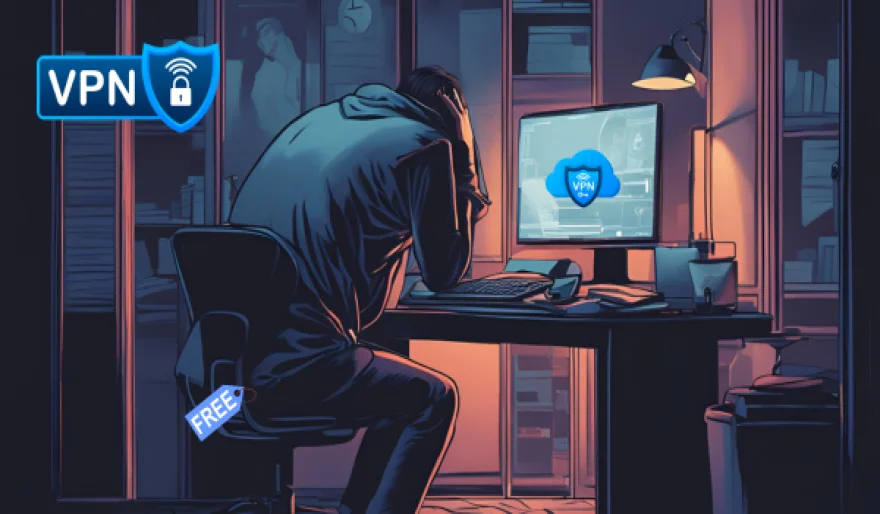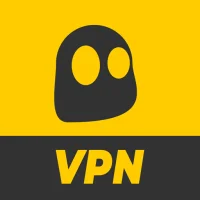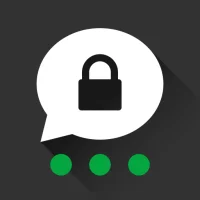Is it safe to use a free VPN?
8 min read In today's world, where our online privacy and security are constantly at risk, using a Virtual Private Network (VPN) has become essential for many. A VPN allows us to protect our identity by hiding the IP address and encrypting the connection, which adds a layer of security to our activities on the Internet. However, while free VPNs may seem like an attractive option, it's important to be aware of the potential risks they come with. Are they really as safe as they seem? Let's break it down. October 23, 2024 17:27
Main risks of using a free VPN
Speed and stability problems
Free VPNs usually have great number of users connected to few servers, which can cause the quality of the connection to be compromised. This translates to:
Reduced speed: The servers are so overloaded that you will notice that your Internet connection is much slower than it normally is. usual. This especially affects when you try to watch high-definition videos, play online games or make video calls.
Unstable connections: Due to overload, it is common for you to experience frequent interruptions or drops in the connection, something very problematic when you perform tasks that require a continuous connection.
Invasive advertising and malware risk
To cover the costs of the free service, many VPNs rely on advertising and collecting user data. This can lead to two key problems:
Annoying ads: Most free VPNs include advertising that can be very invasive, appearing constantly while browsing. Some even inject ads directly into the websites you visit.
Malware: In some cases, using these VPNs can expose you to malware or spyware, since their revenue comes from from selling your data or showing unverified ads. This not only compromises your privacy, but can also put the security of your devices at risk.
Lack of adequate securityOne of the most serious dangers is that some free VPNs do not offer the level of security necessary to protect your data. Some don't even encrypt the connection properly, leaving you exposed.
Weak or non-existent encryption: Without strong encryption, your data could be intercepted by third parties, such as hackers or companies that want to track your activity.
Selling data to third parties: There are VPNs that have been discovered selling information about their users to companies or advertisers, which which completely defeats the purpose of using a VPN to protect your privacy.
Why is a VPN worth paying for?
Choosing a paid VPN offers you a number of benefits that simply aren't available with free options. Here's why it's worth the investment:
Robust data protection: Paid VPNs use military-grade encryption and They do not keep records of your activity, which guarantees that your information is safe and completely private.
Fast and stable connection: They have a much larger and optimized network of servers, which means you'll enjoy a connection without interruptions or slowdowns, perfect for demanding tasks like watching 4K streaming or downloading large files.
Additional features: Paid options often include Extras like ad blockers, DNS leak protection, and 24/7 technical support improve your user experience.
How to Choosing a Reliable Paid VPN
When looking for a paid VPN, it's important to consider several key factors to ensure you're choosing an option that meets your needs:
div>
Service reputation: Research the company that offers the VPN. Look for reviews, user feedback, and make sure it has a good track record in terms of privacy and security.
Privacy Policy: Make sure the VPN you choose has a privacy policy. Strict non-logging, meaning they won't store or track your online activity.
Number of Servers: A good VPN offers a large number of servers distributed around the world. This will allow you to connect to different locations and enjoy better speed.
Speed: Some VPNs can slow down your connection, so it is advisable to test them and check that they maintain good performance .
Technical support: Customer support is crucial, especially if you encounter technical problems. Make sure the VPN has good customer service.
Are there free and secure alternatives?
< div>Although most free VPNs come with significant limitations, some options can be safe and useful if your use is very limited. For example, ProtonVPN and Windscribe offer free plans with restricted features, such as fewer servers or data limits. These VPNs are transparent and prioritize security, but if you are looking for something more advanced and without restrictions, it is always better to opt for a paid version.The best VPNs on the market
To help you choose, here is a list of the most recommended and popular VPNs that currently exist on the market:
ExpressVPN: Recognized for its speed and security, with an extensive network of servers in more than 90 countries. It offers advanced features and an easy-to-use interface.
NordVPN: One of the best-known VPNs, with a strong focus on privacy. It includes features like ad and malware blocking, and a network of over 5,000 servers.
CyberGhost: Popular for its ease of use and ability to unblock streaming services. It offers fast connections and excellent server coverage.
Surfshark: Ideal if you have many devices, as it allows unlimited connections under a single account. It offers good speeds and solid security at a competitive price.
Private Internet Access (PIA): Famous for its focus on privacy and the ability to customize security settings. It has a large number of servers available.
ProtonVPN: Known for its strong commitment to privacy. It has a limited but highly secure free option, and its paid version offers great features.
Windscribe: Offers a decent free version, but its paid version has much more comprehensive features , such as access to streaming servers and higher speeds.
Choosing the right VPN can be a difficult decision, but it is essential to ensure your privacy and security online. While free options can be tempting, paid VPNs offer a much more comprehensive and secure experience.
User Comments (0)
No comments added yet.
If this app is out of date, please let us know in the comments below so our team can update it to the latest version. Thank you.
More »










Popular Apps

Magis tvmagistv.video

Rakuten TV -Movies and SeriesRakuten TV

Genshin ImpactCOGNOSPHERE PTE. LTD.

Temu: Buy like a millionaireTemu

CyberGhost VPN: Proxy SeguroCyberGhost SRL

Zenless Zone ZeroCOGNOSPHERE PTE. LTD.

SOCNASAPPSTAR

KakaoTalk : MessengerKakao Corp.

Hulu: Stream TV shows & movies 3Disney

Threema, the safe messengerThreema GmbH